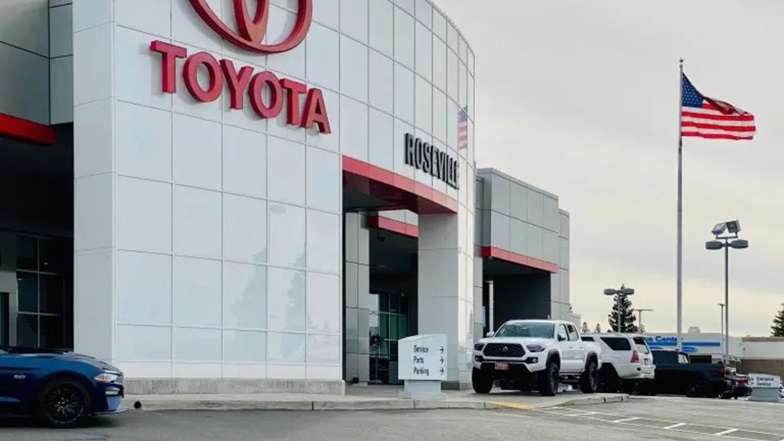In a major stride toward sustainability, Toyota has received a $4.5 million grant from the U.S. Department of Energy (DOE) to innovate and enhance the sustainability of EV battery production and recycling. This initiative falls under the DOE’s ARPA-E CIRCULAR program, a groundbreaking effort to establish a sustainable and domestic EV battery supply chain.

Tackling EV Batteries’ Biggest Challenge
One of the largest challenges in the EV industry is managing old, depleted batteries. Disassembling battery packs and determining which components can be reused or recycled is a painstaking, manual process, both time-consuming and expensive. This is where Toyota Research Institute of North America (TRINA) steps in. Collaborating with Oak Ridge National Laboratory (ORNL), the National Renewable Energy Laboratory (NREL), and Waygate Technologies (a Baker Hughes subsidiary), Toyota aims to reimagine battery recycling processes.
Envisioning the Battery Recycling Center of the Future
The heart of this project lies in tackling critical bottlenecks within the battery lifecycle. Toyota’s vision is to create an advanced recycling facility that automates disassembly, leverages data-driven diagnostics, and reuses valuable materials from old batteries. This “3R facility of the future” will embody the principles of reduce, reuse, and recycle on an industrial scale.
Nik Singh, principal scientist at TRINA and the project’s lead investigator, emphasizes the transformative potential:
“This project will help the industry rethink battery circularity, extend battery life, facilitate reuse, and minimize waste.”
By addressing these challenges, the project could pave the way for a more efficient and sustainable EV ecosystem, reducing the need for raw material mining and limiting waste.
Key Innovations to Close the Loop
Toyota’s plan to revolutionize battery recycling revolves around several cutting-edge technological innovations:
- Automated Battery Disassembly
- Advanced systems will automate the labor-intensive process of dismantling battery packs, saving time and labor costs.
- High-Tech Diagnostics
- State-of-the-art tools will assess the health and viability of battery cells and modules, determining whether they can be reused, refurbished, or recycled.
- Refabrication Techniques
- Old cells will be reengineered into new energy systems, prioritizing reuse over recycling as a last resort.
Environmental and Economic Impacts
The project promises significant environmental benefits. According to Marm Dixit, who is spearheading ORNL’s contributions:
“By extending the life of battery components, we reduce their total emissions per mile. This is crucial for EVs’ role in the energy transition.”
NREL will utilize cutting-edge technologies such as machine learning and nano computed tomography imaging to quickly analyze battery health, while Waygate Technologies will apply advanced non-destructive testing methods to ensure precision.
These efforts aim to create an efficient framework for battery recycling, reducing the overall carbon footprint of EV batteries.
Bridging Lab Innovations to Real-World Applications
Toyota’s Battery Lifecycle Solutions (BLS) team is dedicated to transforming lab discoveries into market-ready technologies. Sarah Kennedy, manager of BLS, explains:
“By applying these innovations, we aim to reduce battery waste and enhance the circularity of our battery supply chain.”
This effort will not only streamline EV battery recycling but also serve as a model for the industry, showing how innovation and sustainability can go hand in hand.
A Glimpse into a Sustainable Future
With the EV market growing rapidly, the demand for sustainable practices in battery production and recycling is more critical than ever. Toyota’s initiative sets a strong precedent for automakers and recycling industries to prioritize resource efficiency and environmental sustainability.
The project aligns with global efforts to combat climate change and transition toward renewable energy sources. By embracing automation, advanced diagnostics, and refabrication, Toyota aims to reduce reliance on mining, extend battery life, and minimize waste—a win-win for the environment and the economy.
Toyota’s efforts to revolutionize battery recycling highlight the importance of innovative thinking in tackling complex challenges. The DOE’s $4.5 million investment underscores the significance of this initiative, not just for the EV industry but for the broader goal of building a sustainable future.
Through collaboration with top research labs and industry leaders, Toyota is paving the way for a more efficient and eco-friendly battery lifecycle. As EV adoption continues to surge, initiatives like this will play a vital role in shaping a greener, cleaner world.
With projects like this, the future of EV sustainability looks brighter than ever, and Toyota is leading the charge. Stay tuned for more updates on how this groundbreaking initiative evolves and reshapes the EV landscape.
Related Post
